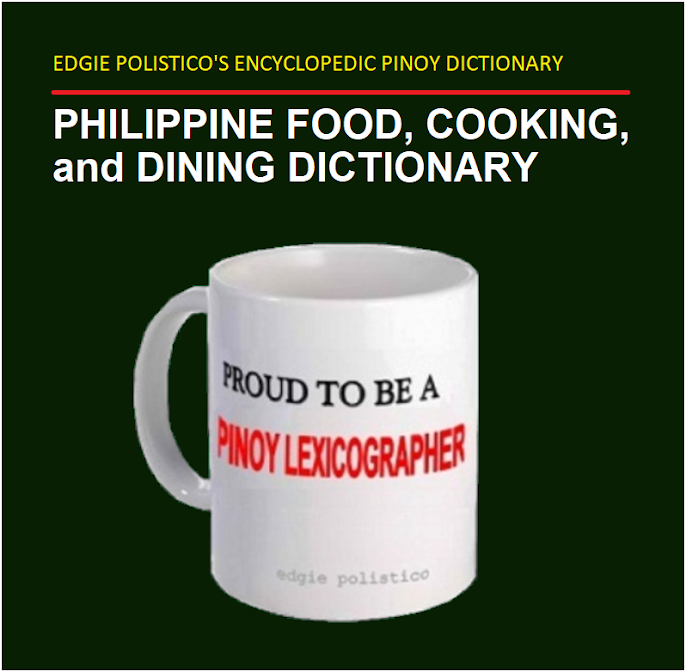ampaw – /ám-paw/ [n.] puffed rice \pop-rice.
(also spelled as ampaw)
Home-made ampao is made of bahaw rice that is sun-dried and then fried to puff.
Special or commercialized ampao is processed using long-tubular steel with a cover designed like that of a pressurized cooker, installed with a safety device that would prevent the lid from catapulting as soon as it is opened under high pressure. The rice grain and a small amount of cooking oil are put into this cooker, covered tightly, and cooked under heated pressure on a stove. After several minutes of heating and shaking, the lid of the pressurized cooker is loosened at once and the rice would pop aloud as soon as the pressure is released. The sudden release of pressure makes the rice grain pop and become puffy as it enlarges the size of each grain in a snap.
The popped rice is then blended with melted sugar or caramel. The sugar-coated puffed rice is either shaped into ampao balls (the size of a tennis ball) in different colors using food coloring or molded into big rectangular shapes and sliced into blocks or bite-size bars.
In Carcar, Cebu, and in Western Samar, a slice of rectangular ampao is topped with a whole piece of roasted peanut. Unlike the ampaw mentioned above, the ampao Carcar is made of cooked rice that is then dried and fried crisp
A bite of ampao nga may mani from Western Samar.
A similar ampaw na may mani from Carcar, Cebu and it is called ampao Carcar.

Ampao Carcar bought in Cebu City
A man peddling ampao balls along EDSA in Munoz, Quezon City; An old lady selling ampao balls at the foot of a footbridge along Commonwealth Avenue in Batasan, Quezon City.


Ampao balls sold along the sidewalk under the viaduct in Alabang, Muntinlupa City; Ampao balls sold at Plaza Miranda in Quiapo, Manila by a grandma and her grandson.
Ampao balls from a sidewalk stall in Bicutan, Taguig
Related posts:

All photos by Edgie Polistico in this blog are copyrighted. ALL RIGHTS RESERVED.
If you liked this post and our site, share it.
Let us know your opinion on the subject. Feel free to comment in the comment section, below. It is important for us to know what you think.
Tell us what other topics you would like us to write, share, and discuss about.
For more about Filipino food, see this Philippine Food, Cooking, and Dining Dictionary. It is OPEN and FREE.
Continue to follow my blogs. You can also follow and learn more by joining us in our Facebook group. Have more bits and pieces about our kind of food, ingredients, and ways of cooking, dining, and knowing food culture across the 7,641 islands of the Philippines.
Encouragement and enthusiasm are not enough. I also need moral support, prayers, and anything else that can uplift my spirit and keep my good reasons. Keep them coming. All I know is that I am happy with what I am sharing and giving away. If you are pleased and happy with what I am doing, just smile and please share the happiness. Keep sharing and include to share the PHILIPPINE FOOD ILLUSTRATED. I feel energized when my blog becomes one of the reasons why you are happy and smiling.
Edgie Polistico
For more about Filipino food, see this Philippine Food, Cooking, and Dining Dictionary. It is OPEN and FREE.
Continue to follow my blogs. You can also follow and learn more by joining us in our Facebook group. Have more bits and pieces about our kind of food, ingredients, and ways of cooking, dining, and knowing food culture across the 7,641 islands of the Philippines.
Encouragement and enthusiasm are not enough. I also need moral support, prayers, and anything else that can uplift my spirit and keep my good reasons. Keep them coming. All I know is that I am happy with what I am sharing and giving away. If you are pleased and happy with what I am doing, just smile and please share the happiness. Keep sharing and include to share the PHILIPPINE FOOD ILLUSTRATED. I feel energized when my blog becomes one of the reasons why you are happy and smiling.
Edgie Polistico
.jpg)

.jpg)



.jpg)






No comments:
Post a Comment
Feel free to write your thoughts now.